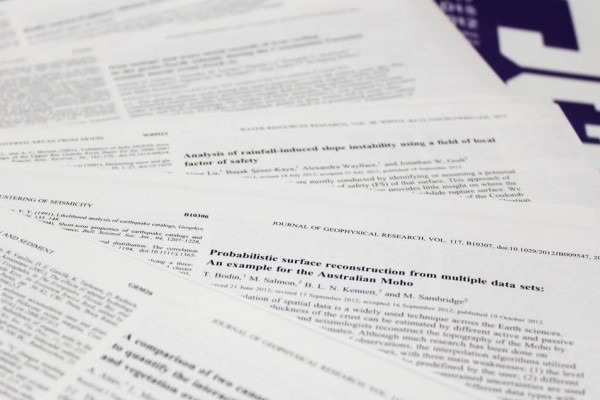15 August 2013
Give your article a good start: Titles for the Geosciences
Posted by mcadams

The number of words in an article title – and even the type of punctuation used – can affect how often an article is cited, according to guest blogger Cecilia Bitz. Photo by Olivia Ambrogio, American Geophysical Union.
By Cecilia Bitz
Guest blogger Cecilia Bitz, an associate professor in Atmospheric Sciences at the University of Washington in Seattle, discusses how the wording and length of paper titles can affect their impact within the scientific community. To get some answers about that impact, Bitz didn’t just run thought experiments – she hunted down some data and prepared a modest but revealing analysis below!
A good title draws you in. You read it and want to know more. A title should advertise the paper, but not promise more than the paper can deliver. An elegant title is not overly wordy. One of my favorite pithy titles is “Arctic sea ice decline: Faster than forecast” by Julienne Stroeve. You know what this paper is about. I can’t think of a more succinct way to say it.
Following my inclination as a scientist, when asked about how to write a good title, I did some research on the relationships between titles and paper prominence. In need of data, I settled on a sample of publication titles from the Science Citation Index on the topic of climate, refined by meteorology and atmospheric sciences in 2000-2001. I decided on these years because the studies are reasonably modern, yet the papers have had enough time to be noticed. The number in my sample totals 2,156. I found there are on-average 12.8 words in the papers’ titles (10.8 if excluding “the”, “a”, “an”, and “of”). The shortest title is “Double ITCZs” and the longest, at 48 words, is too long to repeat here.
Many fellow scientists will be relieved to know that there is zero correlation between the number of words in the title and the number of citation for the papers in this sample. Nonetheless, papers with titles of 6 words or fewer (N=128, less than 6% of my sample) have on average 25% more citations (significantly more than the sample average with greater than 95% confidence). These shorter titles include “Dynamical seasonal prediction” and “Developments in ocean climate modeling.” You can probably see quickly that many of these papers are review articles or foundation papers in the field.
Some authorities deride the overuse of the colon in titles. Just over 20% of the authors succumbed to write titles with colons in my sample. Titles containing colons are on average 2 words longer than those without colons. Titles with colons also have on average 25% more citations (N=469, significantly more than the sample average with greater than 99% confidence). What does this mean? If you can’t be very brief with your title, then break up your words with a colon! Notice this is also the case for the title that I mentioned I liked in the first paragraph.
Could it even be that you decided to read this blog post because its title used this attractive strategy?
There’s a lot more to say regarding paper titles. But, I’ve said enough for now, and hope the readers of this blog will share your own thoughts. How important do you find titles to be when you peruse the literature? Are certain kinds of titles more appropriate for some situations than others? Chances are the titles of your papers follow a pattern that you have honed. Leave a comment and explain your ideas about titles.
— Cecilia Bitz is an associate professor in the Atmospheric Sciences Department at the University of Washington in Seattle, Wash. She is also a recipient of the 2013 AGU Ascent Award.


 The Plainspoken Scientist is the science communication blog of AGU’s Sharing Science program. With this blog, we wish to showcase creative and effective science communication via multiple mediums and modes.
The Plainspoken Scientist is the science communication blog of AGU’s Sharing Science program. With this blog, we wish to showcase creative and effective science communication via multiple mediums and modes.
I try, but always fail, to avoid colons in my titles. I do this because these “some authorities” deride it, as you say. But I think this rejection of the colon is a fallacy. I find 2-part titles with colons far more precise than punchy, broader ones without. Colon-ized (that’s a different word…) titles reflect the scientific process that led to the publication in the first place, and thus provide a more honest or precise announcement of the findings about to be presented.
Subject/Question We All Find Important: How This Team Addressed and/or Answered It.
Who wouldn’t want every title to be like that? Sure it’s tiresome, but it’s accurate. Isn’t that like formal reporting of results, period?
It might also be interesting to see if titles that ask a question have a significantly different citation rate.
I agree using short titles is best.
It would be good to know if asking a question in a title is an effective hook for getting more citations/readers of a paper.
Also, my practice and recommendations to students is to list at least 3 title options and include one with a colon. Then pick the one after the paper is written that tells the story best.
My advice would be to avoid making rash decisions about what to include in a title. Be flexible